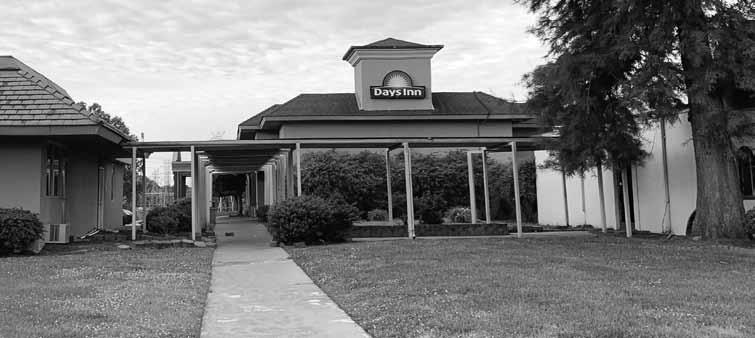
4 minute read
TDOR 2020 Observances
experiencing homelessness. “They throughout the city like the get a full refrigerator with freezer, so growing number of homewe can stock them with food for up less individuals living in tent to a month if necessary,” she says. “If encampments near Roof you can make your own meals and Above’s Day Center. Medley have your own private space — that’s is anxious to help her. freedom for a lot of people.” Hopkins is always upbeat SuPPORT GROwS when people want change in their lives, something Medley
In a mid-year report on There’s is quickly picking up. Still Hope’s website, Hopkins says “Being denied shelter is an she never imagined the challenges of unacceptable act in a wealthy doing this work. “There are too many and free society like ours,” homeless trans people, in particular Hopkins states. “Therefore, trans women of color, still living on our tiny little organization our city streets that desperately need must continue to try and our help, love and support.” make a difference for as long
Advertisement
She lives on a fixed income her- as we can.” self and experienced homelessness For transgender adults in Charlotte for nearly two-and-a-half needing housing support, an years before receiving help from online application is availMonarch, a statewide mental health able at tshcharlotte3.org and and human services provider. “This people can call 704-369-4785 is the door I can walk through,” says between the hours of 10 a.m. Hopkins, remembering that time. to 4 p.m. Tuesday through “They noticed I was determined Thursday. : : to help myself.” There’s Still Hope started from that experience and she qnotes is tells clients about her success story. part of six She knows that people in society see major media what they want to see, but she is companies and other local determined to change those percep- deshon Medley’s life has been transformed for the better institutions producing I Can’t tions. “Let me give you a scenario through participation in the There’s Still hope program, bring- Afford to Live Here, a colof my experience, and you tell me ing him the long sought for stabilithy he needed to survive. laborative reporting project how you would navigate through this (Photo Credit: Chris Rudisill) focused on solutions to the storm that many individuals face.” affordable housing crisis in
In total, There’s Still Hope pays Charlotte. It is a project of the over $1,000 per month to house an individual in the program. In Charlotte Journalism Collaborative, which is supported by the Local August, they were awarded a #YouAreEssential Grant for $2,000 Media Project, an initiative launched by the Solutions Journalism from Ashlee Marie Preston and Revolve Impact. They have also Network with support from the Knight Foundation to strengthen received grants from Equality North Carolina, Freedom Center and reinvigorate local media ecosystems. See all of our reporting at for Social Justice, Borealis Philanthropy and recently received charlottejournalism.org. $5,000 from the Starbucks Foundation Neighborhood Grants program.
Since starting the program, 24 clients have received housing and five prior to those in the program now have gone on to gain both sustainable housing and permanent employment. Medley hopes to save up enough money to move into an apartment of his own. “I don’t want to be in a motel forever,” he says. He also hopes to volunteer for There’s Still Hope after he graduates from the program.
Hopkins relies on her faith to help her power through this work and often prays for “the spirit of discernment” Once a place of which to reside for the transgender homeless, the days Inn on woodlawn Rd. to guide her. In addition to running shut down last May and was at the center of legal battles with its residents over evictions. There’s Still Hope, she also delivers (Photo Credit: Chris Rudisill) groceries regularly to those in need and determined to help

TdOR 2020 Transgender Day of Remembrance Observances & Events
The Transgender Day of Remembrance was started in 1999 by Gwendolyn Ann Smith, to memorialize the murder of Rita Hester, a Black transgender woman, in Allston, Mass. The transgender community worldwide has gathered to honor the names of those who were lost to violence since its inception, a tradition that continues to today. Victims’ names are read, candlelight vigils take place, as well as church services, film screenings, marches and more.
This year, however, has been presented with the challenges of the COVID-19 pandemic. Due to social distancing, quarantine measures and other roadblocks to gathering in person, a large number of regular observances have been curtailed this year. Some have stepped out to hold a few memorials and are included in the list below.
The list of names for 2020 has already surpassed the totals of any other year previously recorded. Especially noted is the overwhelming number of Black transgender women who have been killed during this time. One of the names, Carolinian Monica Diamond, brings loss closer to home.
For more information on the Transgender Day of Remembrance, visit tdor.translivesmatter.info.
Asheville, N.C., Nov. 20, 6 p.m. Host: Tranzmission; Venue: Online
The local nonbinary and transgender community observance includes reading of names, peer support and counseling resources and online vigil. Zoom meeting code and password will be made available om social media and through email by request (info@tranzmission.org, subject line “TDoR 2020 RSVP”) on the day of the event. Visit bit.ly/31JHyCA to learn more.
Jacksonville, N.C., Nov. 20, 6 p.m. Host: Onslow County LGBTQ+ Community Center; Venue: 895 Bridge St.
Join community members to mourn the senseless loss of the lives taken too soon. To learn more, visit onslowcountylgbtq.com.











